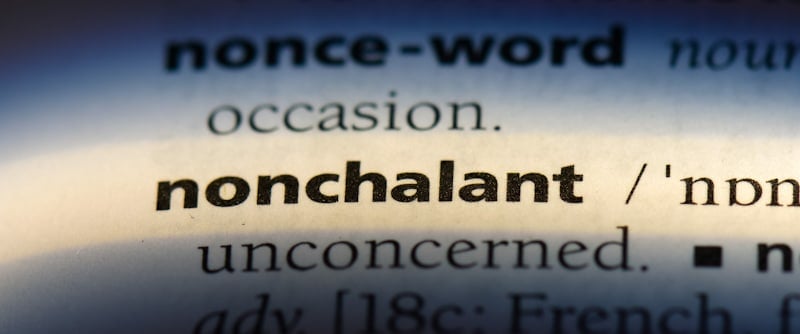What is the correct nonchalant definition? It is a question many people have asked, and it’s not hard to see why. The word sounds cool and mysterious, and it can be used in many different ways. But do we know the correct nonchalant meaning and how to use it in a sentence?
The word nonchalant simply means calm, relaxed, unworried, or unconcerned. It may be that someone has lost interest or doesn’t care much about the topic at hand. When used in a sentence, “nonchalant” shows a lack of enthusiasm.
In this post, we’ll give you a thorough definition of the word nonchalant, as well as well-thought examples so you can have a look at how it is used in context. Are you still curious about this elusive word? Read on!

What Is the Definition of Nonchalant?
The dictionary defines Nonchalant as a calm, casual, or detached attitude, showing a lack of concern. It usually describes someone or something’s behavior. It can also be defined as minor signs of enthusiasm and warmth.
Common synonyms include casual, indifferent, noncommittal, and aloof. Antonyms are attentive, interested, concerned. While most people are familiar with the nonchalant definition and love using the word, most are yet to embrace it.
There are some words associated with nonchalant that might confuse you. The two main words derived from nonchalant include:
Nonchalance
It’s a noun meaning the state of casual, indifferent, or unexcited. Nonchalance is usually viewed as a form of arrogance—approaching situations with an air of unwarranted amusement. But it is not always easy to distinguish between a genuine demeanor and a false one.
Nonchalance is also commonly employed as a synonym for boredom, aloofness, and indifference. For instance, people who appear nonchalant often look uninterested and uninvolved. To show this impression, they might adopt an expressionless face, change their body language, and avoid eye contact with others.
- In a sentence: The man smiled at me with an air of nonchalance and proceeded down the street.
Nonchalantly
It’s an adverb that means casual, relaxed, and calm manner. Some sentence examples of this word include:
- He strode nonchalantly through the streets of New York, strolling past shop windows without glancing at them.
- The boy casually glanced out at the pigs playing in their pen before nonchalantly turning back to his magazine.
- He paused nonchalantly when he reached us, his eyes on each of my friends as if searching for something.
What Is the Meaning of Nonchalant?
The word nonchalant is an adjective that means unconcerned or uninterested. It comes from the French word nonchaloir, which means lacking in flavor.
When someone is described as nonchalant, they are not paying attention to something important, usually concerning another person. You know that feeling when you’re not paying attention to what someone is saying, but then they say something funny, and your eyes snap open? That word—nonchalant.
When used in English, it describes a person who doesn’t care about anything, one who may be apathetic or disinterested. Think of this definition as an opposite for words like “enthusiastic” and “anxious.”
For example, if two friends are having a conversation and one of them is looking around the room casually watching other people while their friend is talking, this would be considered nonchalant behavior on their part.
More like this post: Retribution Definition – Meaning and Usage In A Sentence
How to Use Nonchalant in a Sentence?
Nonchalant is a word that can be used as an adjective or an adverb in a sentence.
I don’t think you’ll ever see it as a noun, although you might hear some people use nonchalanter as slang. An example of nonchalant being used as an adjective is “nonchalant attitude.” In a sentence: The manager was nonchalant about the possibility of layoffs.
The word nonchalant usually suggests that somebody is not very interested in something. That said, you can use the word in:
Non-Verbal Expression
The nonverbal expression is an integral part of communication during conversations and relationships. For example, a smile can say many things at once. It could reveal happiness or the opposite.
A kiss on the cheek shows affection towards another. And for those who are nonchalant will not care about what is going on around them and may not be interested in communicating with others.
Verbal Expression
Nonchalant also describes the tone of voice used to say certain words. For example, Rachel’s nonchalant attitude toward her new job didn’t sit well with her coworkers. Another example: Rachel’s tone was nonchalant when she told us she got a new job.
In the first sentence, Rachel is calm and casual about her new job. In the second sentence, we know that Rachel said it in a casual tone of voice, not because of what she does.
Note that “nonchalant” can apply in positive and negative instances. It’s because someone might be acting nonchalant for peace of mind. After all, nobody wants to have their mind or consent influenced by specific actions, which is a positive way. However, if you act “nonchalant” on your sick friend, that will attract negative thoughts. What matters to all writers is how they use the word.

Learn More: Vain Definition – Meaning and Usage
10 Examples of Nonchalant in a Sentence
The best you can do for now is to write the word nonchalant correctly in a sentence, irrespective of the context. While that’s not easy for everyone, example sentences go a long way. Here are ten examples of nonchalant in a sentence.
- Jane gave Smith a nonchalant smile, and that was the start of the new relationship era.
- Despite the loss of their first game of the season, the team sat down, nonchalant as ever.
- The nonchalant comments on the company’s Facebook post were an eye-opener to how people view the business.
- The model adopted a nonchalant style during the event and surprisingly topped the list of the best performers that night.
- She always gives off a nonchalant vibe when called upon for late-night parties.
- John’s father has remained nonchalant about the son’s performance in high school from the first day.
- The teacher was nonchalant about the class performance, but the parent’s involvement changed her behavior for good.
- Mike’s nonchalant manner made me hate to love, and I still regret it.
- While everybody appeared nonchalant, the game captured the attention of all the fans, even from absent teams.
- My son joined preschool today; though worried about getting along with everything, he was dropped home looking pretty nonchalant.
How Do You Spell Nonchalant?
The most common spelling, according to Google search data, is Nonchalant – nän-shə-ˈlänt.
But the thing is, there is no clear answer to this question. You see, nonchalant is a word with French origins, and many people would argue that it should be spelled by following the rules of French orthography. However, some would say that since English, not French, is the language being spoken, then it should be spelled as English words are spelled.
How Do You Pronounce Nonchalant?
Nonchalant is pronounced as non.shuh.luhnt in British English or naan·shuh.laant in North America.
Nonchalant is an adjective meaning “acting unconcerned or indifferent” or “lacking interest.” It comes from the French word for careless, nonchaloir, and ultimately derived from Latin chalere. The pronunciation of this word varies across English speaking nations.
Many people pronounce it \ˈnon-shə-lənt\ (non-SHAH-lənt), but this is incorrect. It is also not \ˈnon (ˌ) shə-lənt (nahn-SHUH-lənt)\.
How Many Syllables are in Nonchalant?
Nonchalant has 3 syllables: (non-cha-lant). In the article, we mention 3 syllables because it is what native speakers generally use.
Nonchalant is a popular word, especially the non-standard and longer 3 syllable variant (non·cha·lant). Some people, however, use this syllable standard (non·chal·ant) form. A few people might not even know 3 of those syllables exist; many would pronounce it as (non·shal·ant), not (non·shal·ont).
Nonchalant Synonyms
- Unconcerned
- Casual
- Unemotional
- Neutral
- Aloof
- Detached
Nonchalant Antonyms
- Excited
- Biased
- Emotional
- Nervous
- Interest
- Careful
History & Etymology of Nonchalant
Nonchalant comes from the Old French word nonchaloir (13c.), which means disregard. Non stands for “not,” and the verb chaloir, which is Latin means “to concern.”
In English, the word nonchalant can mean being casual or unconcerned about a thing, or it can mean a person’s demeanor is not easily ruffled.
Nonchalant is pronounced differently in English because of different rules for pronunciation. In English, one says non-‘chal- ant. The ‘on’ at the beginning represents a syllable break or a pause between syllables, and the ‘ant’ represents the word’s ending.
When was Nonchalant First Used?
Nonchalant was first recorded as being used in English in 1734.
This word was borrowed from the French during the early centuries. Along with many other words, they are now considered part of our everyday vocabulary.
Conclusion
Nonchalant means not showing or feeling any emotion, such as excitement. Use this word whenever you describe a person who doesn’t care about anything and has no enthusiasm for what they do. The opposite of nonchalant is enthusiastic because people with an upbeat attitude can be described as being “eager” or “enthusiastic.”
With a straightforward nonchalant definition, meaning, and examples explained in detail in this article, you can now use the word without a doubt. Happy writing!
Shawn Manaher is the founder and CEO of The Content Authority. He’s one part content manager, one part writing ninja organizer, and two parts leader of top content creators. You don’t even want to know what he calls pancakes.

